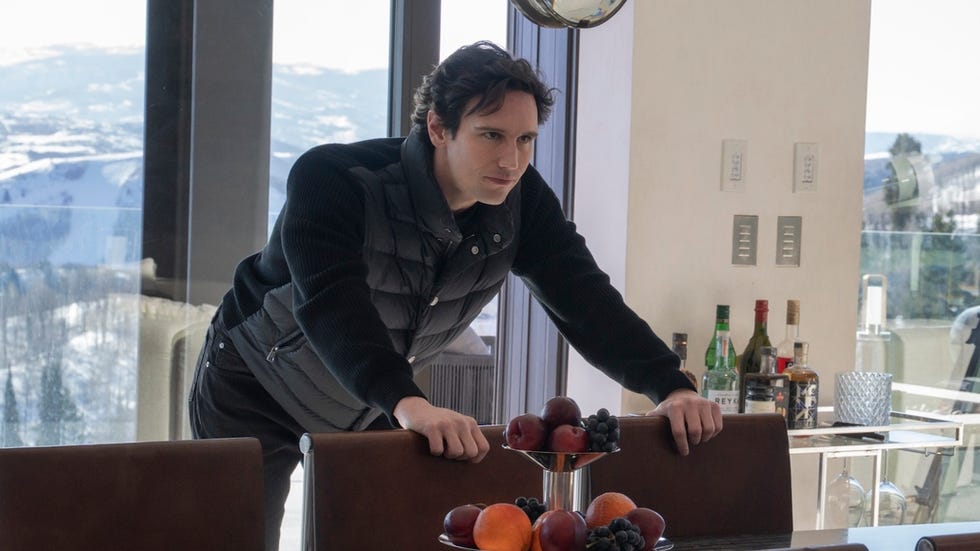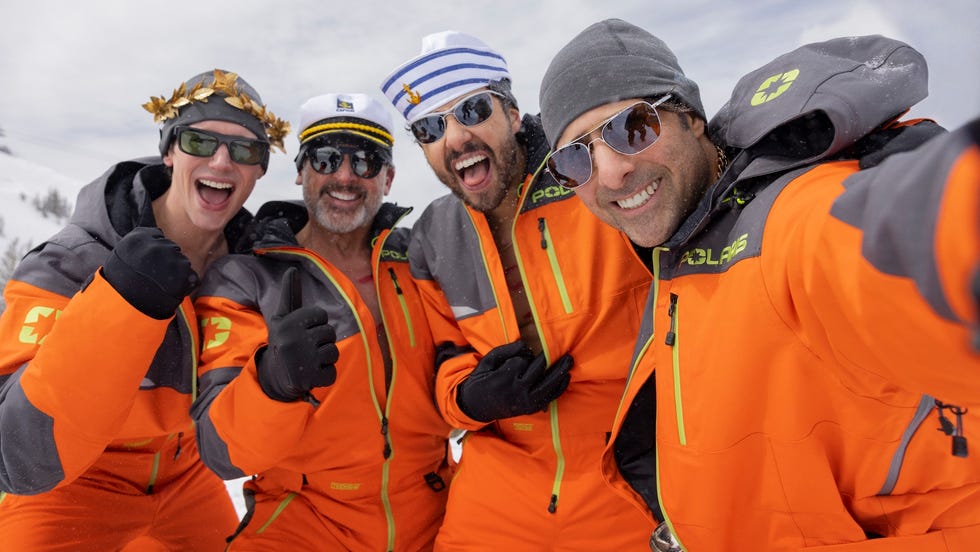How Cory Michael Smith Created the Final Boss of Tech Bros in <em>Mountainhead</em>

Cory Michael Smith is damn good at playing characters who ooze arrogance. In the Batman prequel series Gotham, he played The Riddler with just the right amount of bravado and camp for a man who commits crime while taunting do-gooders with riddles. In last year’s Saturday Night, the 38-year-old actor took on SNL’s Chevy Chase—introducing the comedian by pretending to fall over and then quipping, “Sorry. Tripped over my penis.” Now, in Mountainhead—a new film from Succession’s Jesse Armstrong—Smith plays the richest man in the world right as his social media empire’s new AI platform accidentally ignites global societal collapse.
“I wanted him to be very excitable, and I wanted that to sometimes be a little alarming or uncomfortable where you can't tell if he's on drugs or if he's medicated or not,” Smith told me about his Mountainhead character over Zoom. “There's a line about him needing to jerk off every two hours, so I just wanted it to feel like, What is happening?”
Smith plays Venis "Ven" Parish, a tech giant with the social awkwardness of Mark Zuckerberg and the grand obliviousness of Elon Musk. He’s on a Utah vacation with his wealthy friends—fellow billionaires played by Steve Carrell, Jason Schwartzman, and Ramy Youssef—who all witness governments crumble as Ven’s new AI deepfakes create mass unrest. Basically, no one can tell what’s real or fake anymore. Meanwhile, Ven thrives in the chaos. From the richest man in the world’s point of view, "Nothing means anything, and everything is funny and cool."
Off-screen, Smith is the total opposite of Ven. Even when I suggest that his character very much feels like the center of this ensemble film, he pivots the attention back to his co-stars. “It's like playing sports with the best athletes,” Smith said. “It was such a fucking pleasure. It’s only my second proper comedy that I've done, and I got to do it opposite Steve Carrell, which is so mind boggling to me. I am just endlessly grateful that I had this experience because I learned so much doing it alongside these guys.”
Smith is on a winter retreat of his own when we spoke last week, as he’s currently filming a tight-lipped secret project in Alaska. Whatever it is, I’m sure it’s worth the wait. It led to Smith missing out on attending the Cannes Film Festival earlier this month, where Sentimental Value—a dramedy in which he stars alongside Renate Reinsve and Elle Fanning—won the Grand Prix.
For now, Smith told me all about Mountainhead, working with Jesse Armstrong on his first project post-Succession, and the horrifying experience of being struck by lightning.
ESQUIRE: Before we talk about Mountainhead, I heard that you were struck by lightning once and I’m dying to know the full story there.
CORY MICHAEL SMITH: I was in the marching band and we were at our summer camp practicing. There was a storm coming in, and we knew that when the storm hit, we all just had to run. I was helping some of the percussionists put their instruments into the truck, and at that point I was just absolutely drenched. I stayed out in this storm and proceeded to do one of the dumbest things I've ever done in my life, which was to sit and lean against a metal frame. There was lightning in the area, and one of the buildings got hit and caught on fire. Then, this metal frame that I was leaning against was struck, and I had entrance and exit wounds out of my back. it was quite awful, and I was really humiliated, so I didn't say anything to anybody for a few hours until we went back to practice in the afternoon. I was trying to hold up my trumpet, but my body hurt so badly. I told one of my teachers, “I think I've been struck by lightning.” She panicked and I was taken to the hospital. It was an alarming, scary thing, but I'm just really lucky.
And there are no secret superpowers or anything that you've gained from this?
Who can say, Josh? I mean, maybe I just haven't keyed into whatever gift was given to me from that lightning strike.
I know Jim Carrey is one of your favorite actors, and I feel like I can see his influence in a lot of your work. You both played the Riddler, then you did the SNL film—you gravitate toward similar projects.
I spent a lot of time as a child imitating him, so there's a flavor of him in me. The thing that I really appreciate about him is he's a clown. He's a modern-day clown in cinema, and there aren't a ton of people like that working today. I really appreciated the extravagance of his performances, and they were always complete characters. It wasn't haphazard. I really just loved watching him. And I was a very energetic kid. School and bullying kind of sucked some of that out of me. But theater, growing up, was always a place where I could sort of reengage that instinct. Today, I feel like some of that still lives in me. I like a character who can really fill a space energetically and unapologetically.

"It's like playing sports with the best athletes," Smith says of Mountainhead. "It was such a fucking pleasure."
Ven, quite easily, is the most energetic of the four characters in Mountainhead.
That was really intentional. I wanted him to take up space. I wanted him to be very excitable, and I wanted it to feel like, Is he on testosterone? Is he on drugs? I just needed a lot of energy and I needed to create some discomfort specifically with Ramy's character, so it just felt like these moments of sizzle were really important.
You put together a playlist for all of your characters. I’d love to know what you were listening to on the Mountainhead set.
It was all techno and house music, basically, because I just needed the hype. There’s this one French song by the artist Mr. Oizo called “Positif,” where the only lyric is, “Vous etes des animaux!” which means, “You are animals!” [Smith proceeds to plays a selection of oontz-oontz music from his phone.]
Jesse obviously loves his strings, so I assumed that you were not listening to anything like that.
No, I just needed absolute hype. [Laughs.] All the phones that we were using for the film were operable, so I asked the guy handing our phone props if it was possible to put music on them. And he was like, “I’ve never done that before, but let me figure it out.” So, he made this thing in this app that wasn’t connected to any of the music apps, where basically if I clicked this random button, he could attach a file, and it would play all these different songs. So, I would always have it with me. That was really awesome.
I’m sure it was amazing to work with Jesse right after Succession. Did he seek you out, or did you approach him about working together?
I don't know exactly what the conversations were on that side, but the invitation to audition definitely came from Jesse and [executive producer] Frank Rich, who was more aware of my work than Jesse. But I was just floored. He sent me an early draft of the first half of the screenplay, so it was unfinished, but you could get a grasp of who the character was and what he was like. I was just titillated that I was being considered for this.
I believe Jesse pitched the idea to Casey Bloys at HBO in December, and now here we are, speaking at the tail end of May. It was put together very quickly. I believe casting happened in four or five weeks—Steve being the first one brought on, and the rest of us built around him. I was the second person invited, because there was this uncertainty about how Venis would be contextualized. There's a lot of intensity and chaos brought about by him, and the flavor of that is quite important for the cocktail of these actors.
I like a character who can really fill a space.
Did you base Venis on anyone when you were forming the character?
He's not based on anybody. Jesse's characterization in the script was so strong to me that I had really clear instincts from the first read. I knew how I would want to perform this man and his intensity, his excitability, his apathy, and sometimes performed apathy. I just had a really vivid sense of how I saw this guy functioning, and that's what I presented to them.
It's such a fine line to walk when you're dealing with heavy global problems that you’re turning into satire. What do you think is the secret to pulling it off?
Well, luckily the writing from Jesse is just so superb. So, I know we all felt really secure in his intellect and working for him. The script was just always king, and usually the answers were there. If we needed some guidance, Jesse was a very clear communicator and guide. But in terms of finding the balance of the comedy, a lot of it just that I was collaborating with three extraordinary comedians. I don't want to say it was easy, because it's hard work, but it's easy with these guys.

Smith, Carrell, Youssef, and Schwartzman on the set of Mountainhead.
What do you want to accomplish as an actor moving forward?
It's sometimes challenging to plan, unless you're someone who is creating and producing your own work. But generally, everything comes down to four pieces: the script, the character, the people making the film, and timing. Timing is something that derails a lot of things, but at this point, I am trying to find things that are exciting and new and scary—either in the character or the genre of the film or in the way that it something is shot. But I've had the privilege and the pleasure of consistently working with undeniable filmmakers, and I would like that tradition that I've built to continue.
The thing that I'm excited about is embracing the responsibility of leading more projects. I've been trying to prove over time that my contribution to projects is worthwhile. I try to take things where I know I can make an impact and pass on things where I feel like I'm not. And I am just hoping to find more characters with a greater narrative responsibility. But there are these moments of validation that happen in a career, of being cast in an exceptional job, and this film was so gratifying to me because of how kind and generous and talented everyone was. I feel like I was able to support them in all their performances, and I am so grateful that I had this experience.
esquire



